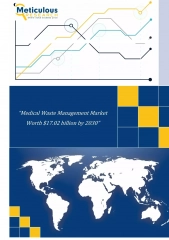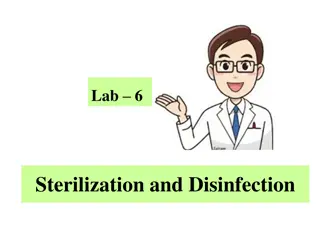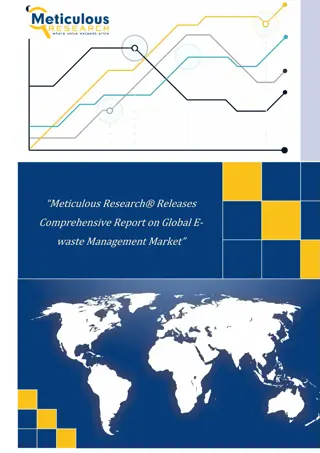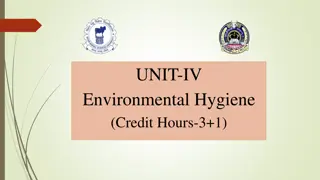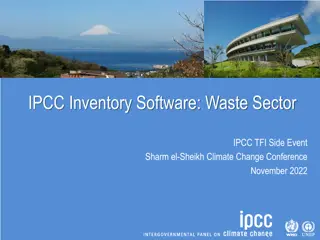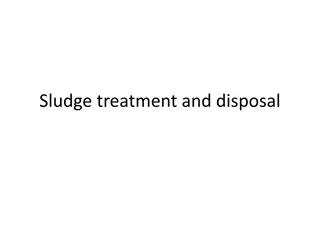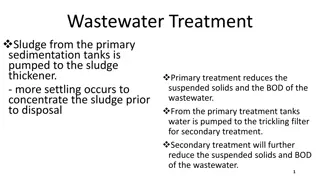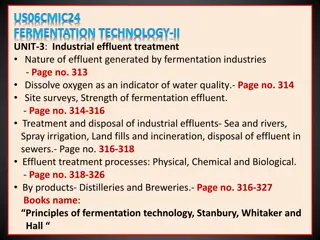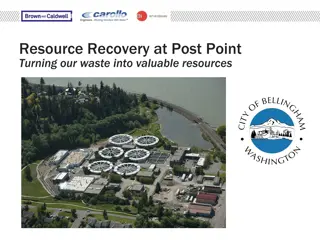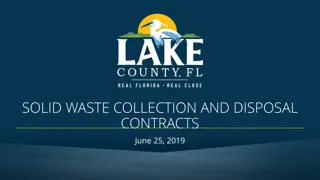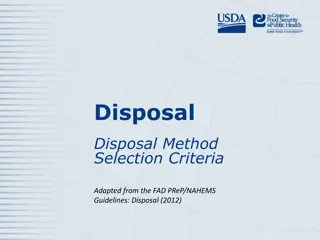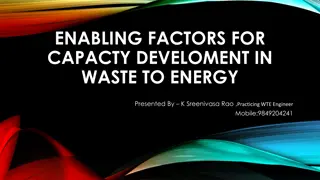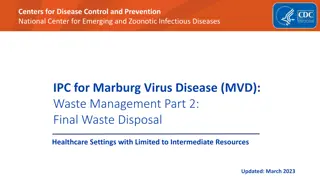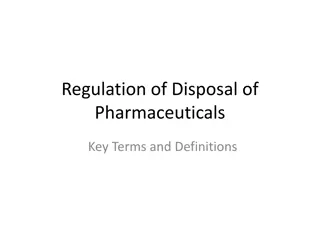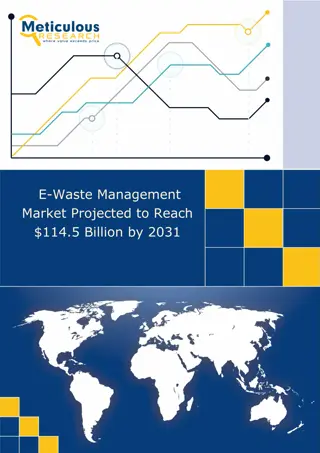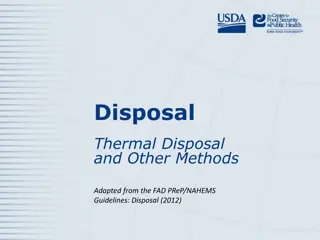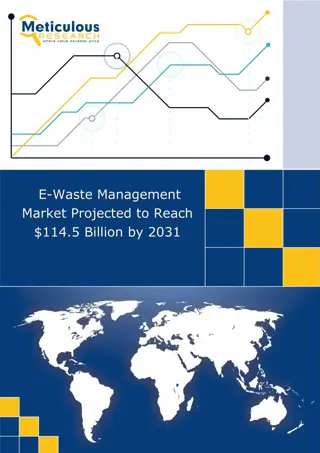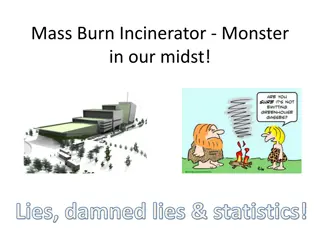Medical Waste Management Market Worth $17.02 billion by 2030
Medical Waste Management Market by Waste Type (Non-Hazardous, Infectious, Sharps, Pharmaceutical), Service (Collection, Treatment & Disposal [Incineration, Autoclaving], Recycling), Treatment Site (Off-site, On-site), Source - Global Forecast to 2030\n
1 views • 4 slides
Understanding Sterilization and Disinfection Methods in Laboratory Settings
Sterilization involves killing all microorganisms while disinfection targets pathogenic ones. Various methods like heat, filtration, radiation, and chemicals are used for effective sterilization. Physical sterilization through heat includes dry heat, direct flaming, hot air ovens, and incineration.
4 views • 21 slides
Medical Waste Management Market to be Worth $17.02 billion by 2030—Exclusive Report
Medical Waste Management Market by Waste Type (Non-Hazardous, Infectious, Sharps, Pharmaceutical), Service (Collection, Treatment & Disposal [Incineration, Autoclaving], Recycling), Treatment Site (Off-site, On-site), Source - Global Forecast to 2030\n
3 views • 5 slides
Meticulous Research® Releases Comprehensive Report on Global E-waste Management Market
E-waste Management Market by Method (Recycling, Dispose\/Trash (Landfill, Incineration)), Source (Household, Industrial, IT & Telecom, Medical, Consumer), Material (Metal (Ferrous, Non-Ferrous), Plastic), Geography - Global Forecast to 2031\n
0 views • 4 slides
Ensuring Hygienic Disposal of Carcasses and Fallen Animals
Disposing of carcasses and fallen animals is a crucial responsibility for veterinarians to maintain environmental hygiene and prevent health risks. Improper disposal can lead to the spread of diseases and attract pests. Various methods, such as burial, cremation, and incineration, are used to ensure
0 views • 22 slides
IPCC Inventory Software Enhancements for Waste Sector Emissions Estimation
Explore the latest enhancements in the IPCC inventory software related to waste sector emissions estimation. Major updates include subnational disaggregation, Tier 3 methods, wetlands supplement, and improvements in worksheet structure and layout. The software allows for detailed estimation of green
1 views • 10 slides
Sludge Treatment and Disposal Methods in Wastewater Management
This comprehensive guide covers various aspects of sludge treatment and disposal in wastewater management processes. It includes information on the composition of sewage sludge, production estimates, sludge content percentages, and calculations for determining sludge volume under different treatment
0 views • 17 slides
Overview of Wastewater Treatment Processes
Wastewater treatment involves primary and secondary processes to reduce suspended solids and BOD levels. Primary treatment utilizes sedimentation tanks followed by sludge thickening, while secondary treatment involves biological methods such as trickling filters. Various secondary treatment methods
0 views • 15 slides
E-Waste Management Market Projected to Reach $114.5 Billion by 2031
Meticulous Research\u00ae\u2014a leading global market research company, published a research report titled,\n \u2018E-waste Management Market by Method (Recycling, Dispose\/Trash (Landfill, Incineration)), Source\n (Household, Industrial, IT & Telec
0 views • 4 slides
Industrial Effluent Treatment in Fermentation Industries
Fermentation industries generate various types of effluent containing organic matter, solids, and other waste materials. With stricter regulations on waste disposal, efficient treatment methods are essential for controlled disposal. This includes physical, chemical, and biological processes to treat
0 views • 84 slides
Resource Recovery at Post Point: Turning Waste into Valuable Resources
Post Point WWTP is undergoing improvements to address the aging solids stream train incinerator and explore opportunities for resource recovery through anaerobic digestion. The project aims to recover resources, minimize social impacts, and meet climate action goals by utilizing biosolids and biogas
0 views • 24 slides
Solid Waste Collection and Disposal Contracts Overview
This document provides an overview of the solid waste collection and disposal contracts as of June 25, 2019. It includes information on the purpose of updating the Board, details of the current collection contract, service areas, annual CPI adjustments, and questions posed to haulers along with thei
0 views • 21 slides
E-Waste Management Market to Reach $114.5 Billion Milestone by 2031
Meticulous Research\u00ae\u2014a leading global market research company, published a research report titled, \u2018E-waste Management Market by Method (Recycling, Dispose\/Trash (Landfill, Incineration)), Source (Household, Industrial, IT & Telecom,
0 views • 4 slides
Guidelines for Animal Disposal Methods
Environmental and biosecurity guidelines recommend various disposal methods such as composting, rendering, permitted landfill, unlined burial, fixed-facility incineration, and open-air burning. Each method has specific selection criteria and considerations to minimize risks to the environment and bi
0 views • 17 slides
Exploring Capacity Development in Waste to Energy Sector in India
The article discusses enabling factors for capacity development in waste to energy sector in India, highlighting challenges, developments, and regulatory aspects. It covers key perspectives from CERC orders, NGT directives, and the impact on waste management. The discussion emphasizes the importance
0 views • 12 slides
Proper Waste Disposal in Healthcare Settings for Marburg Virus Disease
In healthcare settings, proper waste disposal is crucial during outbreaks like Marburg virus disease to prevent health risks for patients, staff, and the community. This involves incineration or non-burn treatment of infectious waste before disposal, emphasizing the importance of appropriate waste m
0 views • 16 slides
Regulations and Disposal of Pharmaceuticals Key Terms
Understanding the regulations around the disposal of pharmaceuticals is crucial to protect the environment and ensure safe practices. Unwanted pharmaceuticals should not be disposed of with regular trash or flushed as they can affect water resources. Incineration, governed by federal Clean Air Act r
0 views • 7 slides
E-Waste Management Industry Forecasted to Top $114.5 Billion by 2031
Meticulous Research\u00ae\u2014a leading global market research company, published a research report titled, \u2018E-waste Management Market by Method (Recycling, Dispose\/Trash (Landfill, Incineration)), Source (Household, Industrial, IT & Telecom,
0 views • 4 slides
Thermal Disposal Methods for Animal Carcasses: Guidelines and Best Practices
Explore thermal disposal methods adapted from the FAD PReP/NAHEMS Guidelines for effectively managing animal carcasses. Learn about high-temperature combustion, fixed-facility incineration, open-air burning risks, and air-curtain incineration techniques. These methods vary in efficiency, environment
0 views • 17 slides
Global E-Waste Management Industry Expected to Hit $114.5 Billion by 2031
Meticulous Research\u00ae\u2014a leading global market research company, published a research report titled, \u2018E-waste Management Market by Method (Recycling, Dispose\/Trash (Landfill, Incineration)), Source (Household, Industrial, IT & Telecom,
0 views • 4 slides
medical waste management market
Innovative treatment methods, including autoclaving and incineration, are evolving to enhance efficiency and reduce the environmental impact of medical waste.\n
1 views • 4 slides
The Impact of Mass Burn Incinerators on Waste Management
Explore the controversy surrounding mass burn incinerators as a method of waste disposal, including their effects on recycling, fuel sources, long-term arrangements, and the end of landfill use. Discover the challenges and considerations associated with adopting mass burn incineration technology in
0 views • 5 slides
